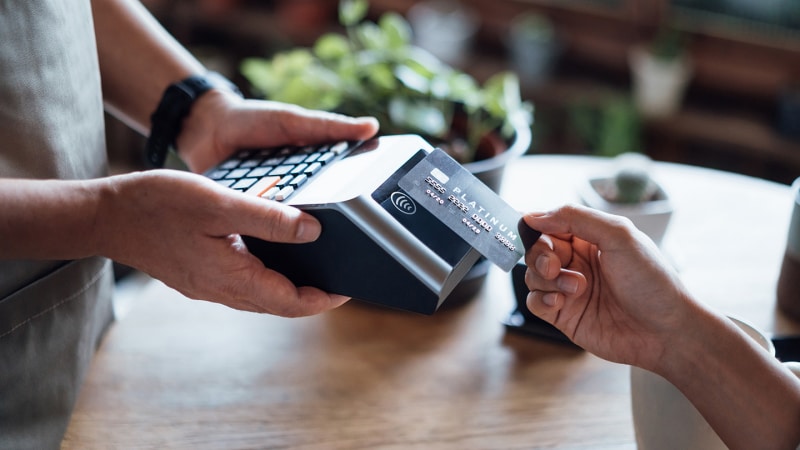Credit cards: What are they and how they work

Quick insights
- A credit card allows you to borrow money from a bank to make purchases, which you then repay later.
- It’s important to understand how a credit card works, including the concepts of credit limit, interest and minimum payments, to help you use it responsibly.
- Having a credit card may offer several benefits including convenience, rewards and the ability to build credit history.
Credit cards are so widely used for spending these days that many people use them without thinking much about it. Even if you have and use a credit card yourself, there are probably several aspects of credit card use that remain unclear to you. Let’s dive into the world of credit cards and help you feel better equipped to use them to your advantage.
What is a credit card?
A credit card is an unsecured, revolving loan that allows you to borrow money up to a certain limit to make purchases, pay for services or get cash advances. Unlike a debit card, which draws funds directly from your bank account, a credit card allows you to borrow money from the card issuer. You're then required to repay this borrowed money, either in full by the statement due date or over time, subject to interest charges. If you don’t pay in full, there is typically a minimum payment amount required each month, which is based on a percentage of your total balance. Key components of a credit card include the card number, expiration date and security code or CVV, which are used to verify transactions.
How does a credit card work?
A credit card comes with a credit limit, which is the maximum amount of money you can borrow on the card. This limit is set by the card issuer based on factors like your income and credit history. If you remain in good standing with the credit card issuer, you may be able to request a higher credit limit should you need one.
The credit extended to you by your credit card issuer is an unsecured, revolving loan. Using a credit card to purchase goods and services may allow you to buy something now and not pay for it until your credit card due date, which could be weeks later. As long as you pay off the balance of this loan by your payment due date you can avoid interest charges. Any balance that is not paid off by the due date will be charged interest. This interest is calculated based on an annual percentage rate (APR), which can vary depending on the card and the type of transaction (purchases, cash advances or balance transfers).
Each month, you'll receive a credit card statement detailing your transactions, total balance, minimum payment due and payment due date. It's important to make at least the minimum payment by the due date to avoid late fees. If you don't pay your balance in full, the remaining balance will carry over to the next month and accrue interest. Additionally, late payments could become a negative mark on your credit report and hurt your credit score.
Key vocabulary for understanding credit cards
If you’re new to credit cards, terms like APR and credit limit might initially feel a bit overwhelming. Here's a list of some of the key vocabulary to help understand how a credit card works:
- Annual Percentage Rate (APR): A card’s APR is the interest rate you're charged for borrowing money using your credit card if you don't pay off your balance in full each month. It's expressed at a yearly rate, meaning that the interest rate includes all fees and costs associated with borrowing, calculated over the span of one year to facilitate straightforward comparisons between different credit options.
- Balance transfer: A balance transfer is when you move a balance from one credit card to another, often for a lower interest rate.
- Cash advance: A cash advance is when you use your credit card to withdraw cash, typically at your bank. Cash advances usually come with fees and higher interest rates.
- Closing date: The closing date on a credit card is the final day of the billing cycle. All transactions made up to this date will appear on your statement. It's crucial for tracking spending and understanding when purchases will be billed.
- Credit limit: A credit limit is the maximum amount of money that a credit card company or financial institution has made available to you. Individual credit cards have a credit limit, and you also have a total credit limit that amounts to the sum of your limit across all of your credit cards. Exceeding the credit limit on a credit card can result in fees or declined transactions and may negatively impact your credit score.
- Credit score: A credit score is a three-digit number representing your creditworthiness.
- Credit utilization ratio: Your credit utilization ratio is the amount of your total available credit limit that you're using. A lower credit utilization ratio of 30% or less is better for your credit score.
- Current balance: The current balance on a credit card is the total amount of money you owe at any given time, including recent purchases, balance transfers, cash advances, fees, and interest. This balance can fluctuate daily based on your card usage.
- Grace period: A credit card’s grace period is the period of time when you can pay off your credit card balance without accruing interest. This is typically three to four weeks after your statement closing date.
- Interest: Credit card interest is the cost of borrowing money, expressed as a percentage of the amount you owe and it’s charged if you do not pay off your balance in full by your due date.
- Late fees: Credit card late fees can be charged by your credit card issuer if they do not receive at least the minimum payment due by the payment due date.
- Minimum payment: The minimum payment is the smallest amount you can pay on your credit card bill to keep your account in good standing. Paying only the minimum can result in more interest charges over time.
- Payment due date: The payment due date is the date by which you must make at least the minimum payment on your credit card to avoid late fees and potential damage to your credit score. This date is typically around 15-30 days after the closing date of your billing cycle.
- Preapproval: Credit card preapproval is an indication that you meet a credit card company’s preliminary criteria and are invited to apply for the card. Preapproval does not guarantee approval if you apply.
- Rewards: Credit card rewards are benefits you can earn by spending on your credit card. They can include cash back, points or miles.
- Statement balance: Your statement balance is the total amount you owe on your credit card as of the last day of the billing cycle. This balance includes all charges, fees, and payments made during the billing period and is the amount you need to pay by the due date to avoid interest charges.
- Statement closing date: The statement closing date is the last day of your credit card billing cycle, on which all transactions up to that date are summarized and reported on your monthly statement.
Why have a credit card?
There are many potential benefits to having a credit card, including:
- Convenience: A credit card offers the convenience of making purchases now and paying for them later, which can be helpful in case of emergencies or when cash flow is tight.
- Building credit: Using a credit card responsibly, which includes making payments on time and not maxing out your credit limit, can help build your credit history. This is important, as a good credit history can improve your chances of getting approved for other lines of credit, such as loans or mortgages, in the future.
- Rewards: Many credit cards offer rewards programs, which can give you cash back, points or travel rewards based on your spending.
- Budgeting: Credit cards can help you keep track of spending, and many cards come with the option to set up account alerts, spending limits and more.
Potential risks of credit card use
While credit cards offer convenience and rewards, they also come with potential risks and drawbacks. One of the biggest risks is the possibility of falling into debt. Credit cards can make it easy to spend money (and potentially spend money you don’t have). If you don't pay off your balance in full each month, you'll be charged interest on the remaining balance, which can lead to significant debt. Credit card interest rates are typically much higher than rates of other credit products, like mortgages or auto loans, so the cost of borrowing money on a credit card may be higher.
One common cause of credit card overspending is trying to earn rewards. It's important to remember that rewards are only beneficial if you're not spending more than you can afford to pay off each month.
Additionally, not managing your credit card responsibly, such as making late payments or using all of your available credit limit, can negatively impact your credit score. This may make it more difficult to get approved for loans or other lines of credit in the future.
It's important to use credit cards responsibly and to understand the potential risks and drawbacks before applying for a card.
How to choose the right credit card
When choosing the right credit card for you, it’s important to consider your financial situation, spending habits and financial goals. You might want to start by determining why you want a credit card. If you're looking to build credit, a secured credit card or a starter credit card geared toward people with limited credit history might be a good fit. If you want to earn rewards, look for a card that offers rewards on the types of purchases you make most often.
Consider the card's interest rate, fees and other terms. If you plan to carry a balance, a card with a low interest rate might be important. If you're looking to transfer a balance from another card, look for a card with a low introductory APR on balance transfers.
Whatever you’re looking for, it can be helpful to read the card's terms and conditions carefully before applying. And remember, there is no single card that is the best fit for everyone; the best credit card for you is one that matches your needs and is one that you can manage responsibly.
The bottom line
Understanding what a credit card is and how it works is a helpful step towards using one responsibly. Knowing how interest is calculated, when payments are due and what can happen if you miss a payment or carry a balance can empower you to use your card wisely. While having a credit card can be convenient, it's important to manage your credit card use to avoid debt and maintain a healthy credit score.



